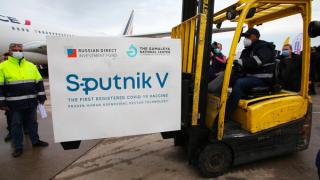If international relations in the first year of the COVID-19 pandemic was all about the politics of aid and mask diplomacy, there is no doubt the arrival of vaccines has made the second year all about vaccine nationalism and distribution – all, of course, as an extension of existing geopolitical competition.
Many of the trends in this area that characterised 2020 have continued into 2021, signalling that we are another year into the period of tectonic changes that are reshaping the international order.
For China and Russia, which were labelled by some as bad Samaritans, 2020 was an opportunity. Both seized on a chance to project their influence by providing medical aid to countries in need, something that proved controversial in foreign policy circles.
If international relations in the first year of the COVID-19 pandemic was all about the politics of aid and mask diplomacy, there is no doubt the arrival of vaccines has made the second year all about vaccine nationalism and distribution – all, of course, as an extension of existing geopolitical competition.
This year, the revisionist duo leaned in hard to domestic vaccine manufacturing and global distribution accompanied with mighty PR campaigns.
China’s Sinopharm and Sinovac and Russia’s Sputnik V vaccines have been the jab of choice for many developing countries around Asia, Latin America, and Africa for their price and accessibility amidst the global shortage of vaccines.
These vaccines have even made inroads in Europe – both in European Union (EU) member states such as Hungary and those vying for membership like Serbia – much to the EU leadership’s chagrin.
On the latter note, the EU’s failures in responding to the biggest public health crisis in a century have been another aspect of continuity from last year. While there was a brief moment of hope that solidarity would reign supreme, most of it was overshadowed by the long tussle over its budget and severely lagging vaccination rates.
There is no shortage of analyses that seek to explain why it is that the world’s ‘civilian superpower’ dropped the ball so badly when it came to securing and administering vaccines.
From the perennial issue of cumbersome bureaucratic processes to penny-pinching and amateurish deal making, criticism abounds. Not helping matters is the seeming politicisation of particular types of vaccines and considerable vaccine hesitancy in European populations.
On the other hand, surging rates of vaccination in the United States and slowing infection rates have served to prove that ‘leadership matters’ is not just a worn-out political adage.
President Joe Biden’s administration has certainly hit the ground running and keeps on breaking self-imposed milestones by trusting scientists and mobilising state and local governments to help with the federal response.
If anything, the incumbent administration is now being faulted for its success in vaccinating the population – and is accused of not generously sharing its supplies with the rest of the world.
At the international level, states continue to show that for governments, pursuing self-interest comes before the common global good, despite the pledges to the contrary.
Clearly, the trends in the United States are in stark contrast with the previous administration’s handling of the pandemic, and most tragically, they have opened questions about why the deaths of over half a million Americans weren’t prevented by faster action by the previous administration.
Above all, amidst all the handwringing about relative public relations victories for Russia and China and botched responses in Europe and the United States, there are only cursory concerns about the fact that the poorest countries are nowhere near the front of distribution chains.
These usually come as warnings from the top officials at intergovernmental organisations such as the World Health Organization and the United Nations, but they are seemingly falling on deaf ears.
This is perhaps the most glaring contradiction that has emerged as a result of the pandemic. On the communal and intra-state level, we have seen numerous instances of solidarity – some have even resulted in movements that seek to right centuries of systemic injustice.
At the international level, on the other hand, states continue to show that for governments, pursuing self-interest comes before the common global good, despite the pledges to the contrary.
If this pandemic has taught the world anything, it is how small the international community is, and how closing borders can work for only so long and for only certain countries. The last year should have taught policymakers that unless the whole world can be protected from the virus, no one can really be safe. If they haven’t mastered that lesson, they better learn quickly.
The other thing almost everyone has learned over the past year is that while keeping hope is crucial amidst the global gloom, when things change suddenly, all bets about the future are off. Regrettable as it is, those hoping for, let alone predicting, a renaissance of international cooperation in the wake of the pandemic may be setting themselves up for disappointment.






